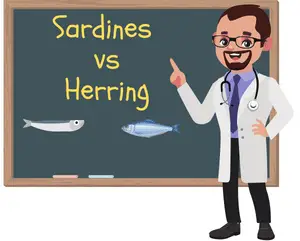Sometimes buying fish in the supermarket can be a challenging experience, especially when choosing among two types of fish you don’t know very well.
It can be the case for sardines and herrings.

Have you ever wondered what the main differences between sardines and herring are?
Both sardines and herring share the same nutrient in omega-three that are very common on those types of fishes, have both a fantastic flavor, the only slight difference is dictated about the size, where the herring can grow more than sardines.
If you have to choose among the 2, don’t worry, you can take anyone available since it will not make any difference in the taste and nutrition values.
What is sardines?
Sardines are small fish with a fantastic taste and incredible benefits for humans. It has been consumed for a long time, and they continue to be one of the most favorite types of fish around the world.
The sardines are a valuable source of proteins and contain calcium and phosphorus, necessary for strong bones.
You can find many varieties of sardines: fresh, canned, and oils, and the recipes you could make are infinite.
See also : 8 Reasons Sardines Are Good for You
What is herring?
Herring belong to the Clupeidae family, and as well as for the sardines, they share the exact characteristics of moving in branch.
The most common places where herring are found are the coast of the Atlantic, the Pacific, and the baltic sea.
Herring as sardines can be consumed in various ways, smoked, salted, picked.
They represent an essential role for the marine fisheries in Europe, where they are sold immediately after being caught due to the considerable demands in maritime cities.
Sardine vs herring: Nutrition value
The nutrition value of sardine-herring is almost the same; most of the differences among the two is how they were processed.
If you compare the calories of herring and sardines, you will notice that the herring will result in more.
Regarding the omega-three value, we all know that both sardines and herrings are famous for being vital resources.
And if you are searching to buy the one among the 2 that has more omega 3, you don’t have to worry too much because they both share almost the same amount of omega 3.
100 grams of herring contain 1.7 g of Omega 3, while 100 of sardines contain 1.4 of omega 3.
Sardine vs Herring: Difference in size
Both sardine and herring are not famous for the length they can reach, but only for the fantastic taste that makes our dishes delicious and the incredible quantity of nutrients they have.
However, if we want to be precise, another minor difference between sardine and herring is related to their length.
Sardine can reach a maximum length of 27cm, but they average around 15 cm, while herring can grow to about 46 cm maximum, with an average length of 38cm.
Sardine vs Herring: Taste Difference
When it comes to taste, both sardine and herring have a powerful taste of fish, and they both will make you remember the flavor of the ocean.
Both have a delicate texture and can be eaten differently.
One of the best ways to cook sardines or herring is by grilling them. Sometimes they are undervalued as fish, but the flavor that a grilled sardine or herring could give is unreachable for the majority of the fishes.
Other ways to prepare both sardine and herring are by making it with pasta or topping on a pizza.
Sardines vs. Herring: Cost differences
Sardines and herring can easily be found in the majority of the supermarket, and depending on the types that you are searching for, you may find or not.
The cost of sardines and herring is not that different; what substantially varies is whether you buy them elaborate or not.
The lowest cost is the smoked one. They can be easily found for a price of 3$ per 4 once.
While the fresh one can cost you something near to 15$ per 5 pounds.
Conclusion
Both sardines and herrings have almost the same nutrient benefits, and the taste will be pretty much the same. The size dictates the main difference between sardines and herring ; otherwise, they were almost identical.
